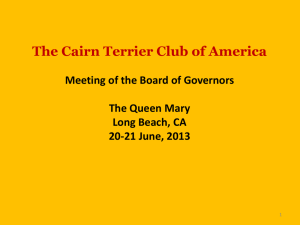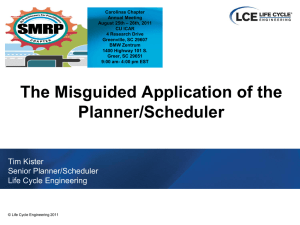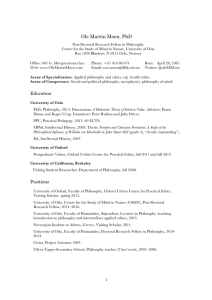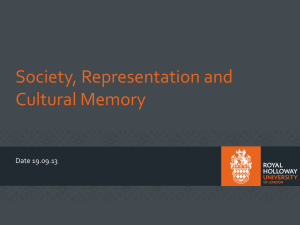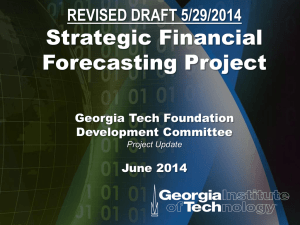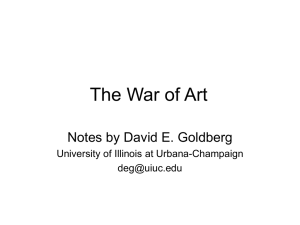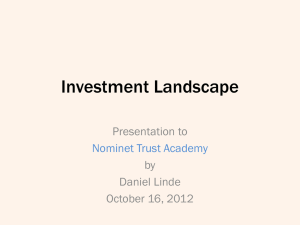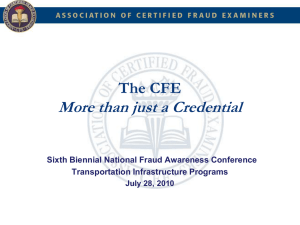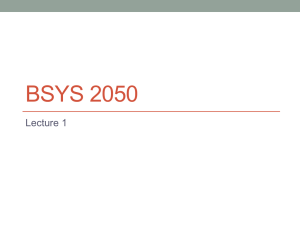AICP Ethics Case of the Year 2012–13 PowerPoint presentation
advertisement
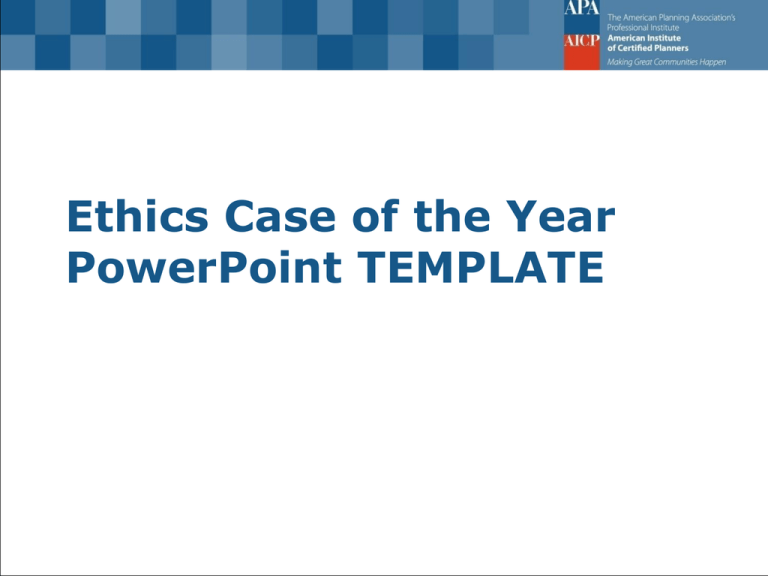
Ethics Case of the Year PowerPoint TEMPLATE Advice on Conduct: Please Note This session has been created to provide general education regarding the AICP Code of Ethics. Though examples, sample problems, and question and answer sessions are an important part of illustrating application of the code’s provisions, all certified planners should be aware that “Only the Ethics Officer [Chief Executive Officer of APA/AICP] is authorized to give formal advice on the propriety of a planner’s proposed conduct.” (AICP Code of Ethics, Section C3). If you have a specific question regarding a situation arising in your practice, you are encouraged to seek the opinion of the Ethics Officer. Use of this Slide Show The slides here are intended to be samples Pick slides that illustrate aspects of the case of interest Bullet points on each slide are fleshed out in “NOTES” area. Ethics Case of the Year – 2012-13 A planning director of a modest-sized city in her third year on the job has a staff of 40; her portfolio includes typical planning responsibilities as well as permit operations. An AICP member, she works in a strong mayor form of government with a very popular mayor who is in his second four-year term. He has made it clear to everyone that he is going to run for a third term, although the election is 15 months away and the filing window doesn’t open for several more months. The city continues to experience a very modest amount of development— with both steady job growth and population growth. Ethics Case of the Year – 2012-13 The city retains a small-town feel and the mayor, as were most of the community’s elected leaders, was born and raised in the city and operated a successful family-owned business before running for mayor. In fact, he also touts planning as essential to the city’s future just as it is essential for any well-run business. Ethics Case of the Year – 2012-13 In his first year in office, the mayor organized an event on July 4 as a fundraiser for disadvantaged children. This now annual, day-long event is held in a downtown city park. Admission is “donate what you can,” with a wellknown expectation that directors of city agencies plus their top two to five staff each donate at least $100. Major sponsorships by two dozen or so businesses, including major design firms, are in the $10-50,000 range. All of the food and soft drinks are donated for the event, with almost all of the work by volunteers, including some city employees. Of course, it is July 4, so elected officials of all parties give speeches throughout the day. Over $1 million is raised for the charity. Ethics Case of the Year – 2012-13 The mayor’s opponents have noted that the major sponsors plus those who donate food and services are also political supporters of the mayor, although no questions have been raised about improper use of funds—it is all done through a local community foundation. The foundation’s board of directors also includes many political and business supporters of the mayor. Ethics Case of the Year – 2012-13 This has become the big event on July 4 for citizens, although there are also neighborhood events and private events throughout the city that elected officials, including the mayor, visit July 3–4. The event has grown each year, most recently through social media used by the city, businesses, neighborhood organizations, and others. Tweets throughout the day add to the sense that this event is the place to meet. Ethics Case of the Year – 2012-13 (cont.) Scenario #1: Director “Encourages” Donors The planning director “encourages” her top four direct reports to attend and make the $100 “suggested” donation. She makes a more substantial, taxdeductible donation. Other staff are encouraged to attend as well and make whatever donation they are comfortable with. Are there ethical concerns? Ethics Case of the Year – 2012-13 Scenario #2: Political Opponents of the Mayor There is some political opposition and one candidate already has declared that she will file her papers as soon as the window for filing opens. She has raised concerns about the mayor’s July 4 event, noting political/business ties and the well-known effort to get city staff to attend (and donate). Also, she has tweeted that no permits were taken out and the parks director has responded by tweeting that it is a city event, not a private one (although, technically, all money is run through the private foundation) so permits aren’t required other than the county health permit that was secured. Ethics Case of the Year – 2012-13 Scenario #2: Political Opponents of the Mayor The opponent, in order to prove that it is a political event, has announced a “3rd of July” event in another city park with money passed through a neighborhood not-for-profit that opposes the mayor. She has asked every city employee who donates to the event backed by the mayor to donate to her event that will help feral cats, a growing problem in many neighborhoods. What should the director do? Ethics Case of the Year – 2012-13 Scenario #3: A $50k Angel Donor Is a…Developer One of the $50K “angel” supporters of the mayor’s event is a developer who is on the foundation board executive committee. In the early fall, he proposes a new, big box store on land that includes a federally and locally designated wetland. He trumpets the fact that he will finance the project entirely through private means without the use of any public monies. Many permits in the city are discretionary and typically, the planning director plays a major role in all project reviews and permitting actions. Ethics Case of the Year – 2012-13 Scenario #3: A $50k Angel Donor Is a…Developer The city has its own “NEPA-like” process that includes an option for a city Finding of No Significant Impact (FONSI) that is a part of the conditional use permit process required for all disturbances of wetlands in the city. The planning director typically makes final recommendations to the city council after staff review; final action by the city council is required, typically by consent agenda although any member of council can request that an action be removed from the consent agenda and brought forward for a discussion before any vote. Ethics Case of the Year – 2012-13 Scenario #3: A $50k Angel Donor Is a…Developer Given the concerns about the political/business ties, the planning director informs the mayor—even before the developer has formally filed an application or the staff evaluation has begun—that she would like to turn project oversight on the wetlands issue over to an administrator from the state Department of Environmental Conservation (DEC) and that city council action on any environmental findings, including the possible Finding of No Sign of Impact (FONSI), would require a public hearing. Ethics Case of the Year – 2012-13 Scenario #3: A $50k Angel Donor Is a…Developer The mayor privately objects, raising questions of loyalty in a meeting with the city attorney and the planning director. “Don’t you trust me or even your staff?” is a question posed by the mayor. What ethical issues must the director consider? Ethics Case of the Year – 2012-13 Scenario #4: Strict Environmental Planner (AICP) A senior environmental planner (also AICP) who has been working for the city for almost 10 years has become increasingly strict in his environmental reviews. The director trusts him but occasionally has had to overrule his recommendations based on technical evaluations from other professionals, who are both in the public sector and under contract to private entities. Ethics Case of the Year – 2012-13 Scenario #4: Strict Environmental Planner (AICP) Knowing the heated battle that is already beginning over the big box retail project, the director has now dropped the idea of the state administrator’s oversight and has assured the mayor that she will, instead, hire a consulting firm as an independent third party to carry out this environmental review, with the consultant reporting directly to her chief environmental officer (not AICP), a position between the planning director and the senior environmental planner. This will effectively remove the senior environmental planner (AICP) from any influence on the project. Ethics Case of the Year – 2012-13 Scenario #4: Strict Environmental Planner (AICP) The senior environmental planner leaks this proposal to a close friend with an active environmental organization, which begins a social media campaign against the project, the director, and the mayor, while advocating in favor of the environmental review being conducted by the senior environmental planner, following the department’s well-established standard operating procedure. What are the ethical issues and what steps should be taken? Ethics Case of the Year – 2012-13 Scenario #5: Outside Firm to Handle Review The city has decided to hire an outside firm to handle the environmental review. The directors of planning, engineering, and economic development comprise the three-person selection team, with the RFP to be issued near the end of the year. Several local engineering and planning firms are known to be interested, including at least two that are major contributors to the mayor’s July 4 event. One of them sponsors an annual holiday party that attracts community leaders, elected officials, public agency staff and many design professionals, including competitors of the sponsoring firm. Ethics Case of the Year – 2012-13 Scenario #5: Outside Firm to Handle Review This is one of the “see and be seen” events of the holiday season. The planning director, along with the other directors and top staff, attend each year. There are not any fees or donations associated with the event. Should the director attend? Should the consulting firm (headed by an AICP planner) invite the three directors on the selection committee, or exclude them this year? Ethics Case of the Year – 2012-13 Scenario #6: Employee Has Data Early in the new year, the contract has been awarded to the firm that sponsors the holiday party, and the bypassed senior environmental planner has decided to explore other job options while still employed by the city. In one job interview with a rival to the firm that was awarded the environmental review for the big box project, he implies that he probably can secure a contract from a well-funded coalition that seeks both to block the big-box project and to strengthen the city’s environmental standards. Ethics Case of the Year – 2012-13 Scenario #6: Employee Has Data Both the project and the standards have become political issues in this year’s mayoral and city council elections. The job applicant touts his knowledge of the city, also noting that he has maintained his own file of city documents on his home computer. He also suggests that some of the anti-project information on the coalition’s website came from him. The interviewer is also AICP. Ethical concerns? Ethics Case 2012-13 – the Set Up Planning Director, AICP, modestsized city, 3rd year on job, staff of 40. Mayor seeking reelection to 3rd term. Election is 15 months away. Modest development, job and population growth. Ethics Case 2012-13 – the Set Up Small-town feel, good political support for planning. Mayor’s 4th of July fundraiser. Donations sought from city senior staff, major sponsors. Food donated, more than $1 million raised for charity. Ethics Case 2012-13 – the Set Up Mayor’s opponents note donors are also his supporters. Community foundation distributes the funds. THE event for local leaders and citizens, promoted through use of social media. Director “Encourages” Donors Her top four direct reports are encouraged to attend and donate $100. She donates more; other staff also are asked to give. Are there ethical concerns? Political Opponents of Mayor Mayoral candidate-to-be has raised concerns and tweets that permit procedures not followed. She sets up rival “3rd of July” event, asks city employees to donate to that one as well. What should the planning director do? A $50k Angel Donor Is a…Developer Supporter of mayor’s event has proposed big box store. Will it disturb wetlands? Director asks if state body should oversee project. Mayor flips: Don’t you trust me? What ethical issues must the director consider? Strict Environmental Planner (AICP) Environmental reviews increasingly strict, occasionally overruled by planning director. Director to hire outside firm, dropped idea of state oversight. Consulting firm reporting to Chief Environmental Officer (non-AICP). Outside Firm to Handle Review Selection of firm: Several interested firms are 4th of July donors. One of proposing firms also has big holiday party. Should the director attend this year? Should the firm invite selection committee or exclude them? Employee Has Data Bypassed Senior Environmental Planner being interviewed for other jobs. Political issue over big box project brewing. Senior Environmental Planner suggests sharing information. Interviewer AICP as well. Concerns? Title Bullet Point One Two Etc. Title Bullet Point One Two Etc. Title Bullet Point One Two Etc. QUESTIONS? www.planning.org/ethics

